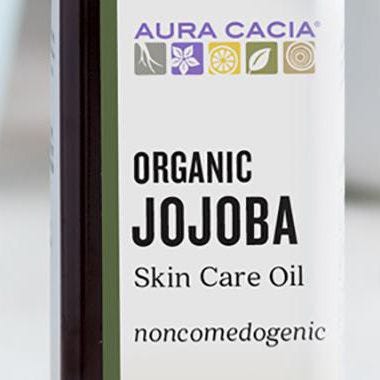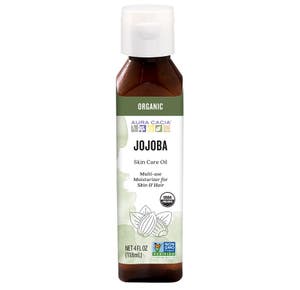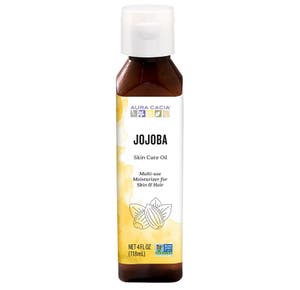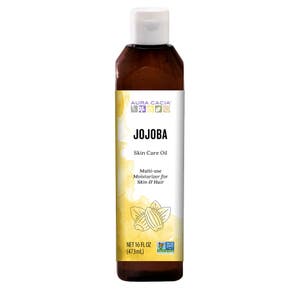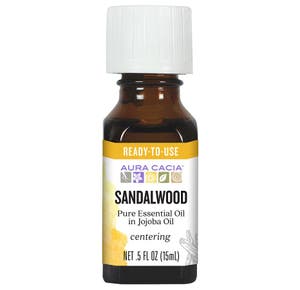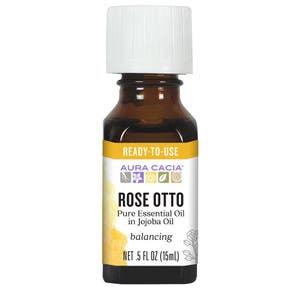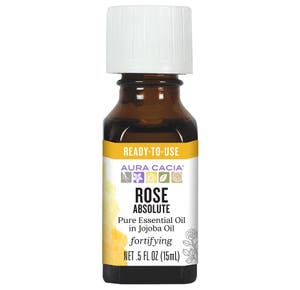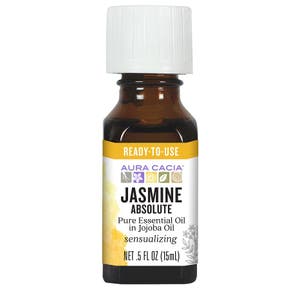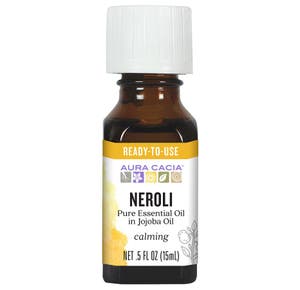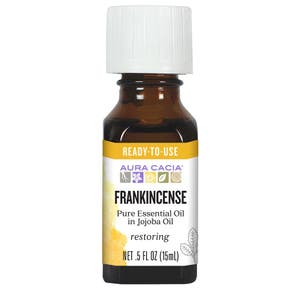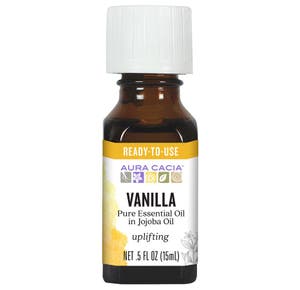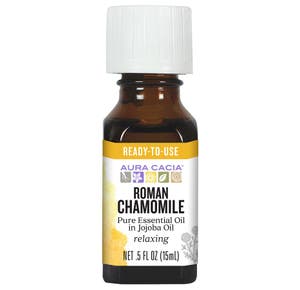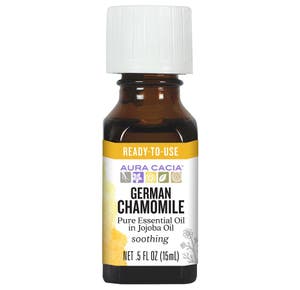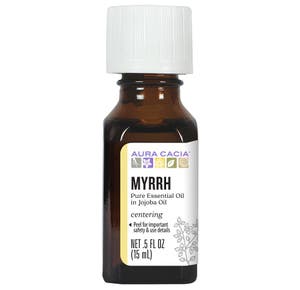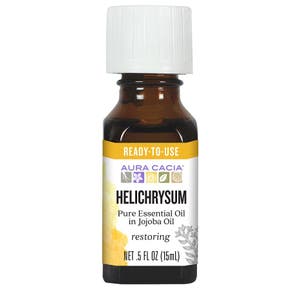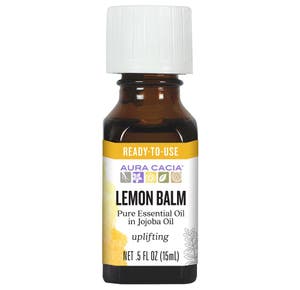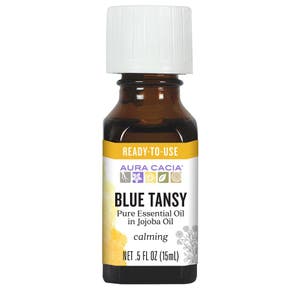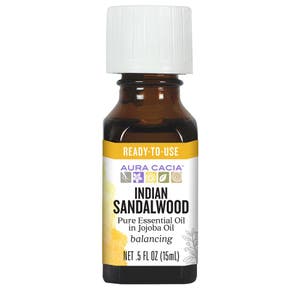Written by Betsy Miller, MSc
Jojoba oil has various benefits for skin, including its moisturizing and soothing properties. Explore the capabilities and uses of jojoba oil with Aura Cacia.
6 Benefits of Using Jojoba Oil for Skin Care
Jojoba oil, pronounced as “ho-HO-ba” is one of our favorite carrier oils for skin and hair care. Fun fact: jojoba is actually a liquid wax ester, rather than a true fat-based oil, and closely resembles the sebum (oil & wax) produced by our own skin, making it a perfect choice for skin care. Keep reading to learn all about this incredible skin care oil, where it’s from, how to use it, skin benefits, and Frequently Asked Questions.
What is Jojoba Oil?
Jojoba oil comes from the seed of the Simmondsia chinensis plant, a small shrub that is native to parts of the Southwestern United States and Northwestern Mexico. The jojoba plant, including the wax/oil from the seed, has a rich history of use for skin health amongst the Native peoples indigenous to those regions. The name jojoba comes from the word Hohowi, the name given to the seeds/beans by the O'odham people. The oil is extracted by cold-pressing the seeds of the Simmondsia plant, and doesn’t require any processing or refining in order to be used. Another fun fact: when whale hunting became illegal in the 1970’s jojoba oil replaced the whale oil and other animal fats that were commonly used in cosmetic products.
Jojoba Oil Benefits for the Skin
- It’s non-comedogenic: Because jojoba oil so closely resembles the natural combination of oil and wax produced by our own skin, it’s less likely to clog pores. This feature makes jojoba a great choice for all skin types, including acne prone and combination skin.
- It helps balance sebum production: When applied to the skin, the resemblance of jojoba oil to our natural sebum actually sends a signal to our hair and sweat follicles that we don’t need to produce any more sebum for moisturizing. This communication with our skin helps prevent excess oil production and clogged pores.
- It’s hypoallergenic: Jojoba oil is a top choice for anyone who has extremely sensitive or easily irritated skin. As a liquid wax ester rather than a fat-based oil, it’s extremely well tolerated by all skin types and is unlikely to cause any type of skin reaction.
- It’s moisturizing: Jojoba oil is considered to be a humectant substance, meaning it actually attracts water to the top layer of the skin to help it stay hydrated. Applying jojoba oil to clean, damp skin enhances this effect.
- It’s soothing and protecting: Jojoba oil is rich in vitamin E, an antioxidant vitamin that helps protect your skin from damage due to daily exposure to irritants.
- It’s toning: The combination of jojoba oil’s moisturizing properties and high vitamin E content supports skin elasticity and integrity, leaving the skin looking smooth and vibrant.
How to Use Jojoba Oil
Jojoba oil can be used as-is directly on the skin, or blended with essential oils and other carrier oils for additional benefits. When applied to clean, slightly damp skin, jojoba oil will help to lock in that moisture for all-day hydration. Massage a small amount onto your face for a toning facial serum, or blend with sesame oil for a luxurious and softening winter skin body oil.
Jojoba oil is safe to use around your eyes, nose, and mouth, so it can even be used as a makeup remover for oil-based makeup.
You can also use jojoba oil in your hair. Its moisturizing properties make it a great choice for dry or damaged hair, and it won’t leave a greasy sheen like many other oils. Massage a few drops into damp hair, or even add a few drops to your favorite conditioner.
One of the best features of jojoba oil is its shelf-life; because it’s a wax ester rather than a fat-based oil it has a much longer shelf life and won’t go rancid over time like other carrier oils. Adding jojoba oil to your homemade serums, creams, salves, and other skin care products will actually help to extend their shelf-life as well.
Our Favorite Products Featuring Jojoba Oil
In addition to our ready to use Aura Cacia Jojoba Oil, we have several products that feature jojoba as a key ingredient. Jojoba is used to dilute some of our more rare essential oils, like our Frankincense in Jojoba Oil, so that they are more affordable and ready to use on the skin right out of the bottle. Jojoba oil is also a key ingredient for moisturizing skin in our line of Bodi products, such as the Aura Cacia Bodi Normal to Dry Skin Oil Moisturizer. You can also find jojoba oil in our foam bath products to leave your skin feeling smooth and silky after relaxing in an Aura Cacia Lavender Foam Bath.
Jojoba Oil Frequently Asked Questions
Q: What is jojoba oil good for?
A: Jojoba oil is a great choice to help balance acne prone or combination skin- use it as a daily facial serum to improve hydration without clogging pores.
Q: Does jojoba oil clog pores?
A: No! Jojoba oil closely resembles the sebum (combination of oils and wax) produced by our own skin, so it actually balances oil production and is non-comedogenic.
Q: Can I use jojoba oil every day?
A: Absolutely! It’s a perfect nourishing oil for daily use.
Q: Does jojoba oil go bad?
A: Unlike other carrier oils, jojoba oil is actually a liquid wax ester. Its chemical structure means it’s not prone to rancidity over time like most carrier oils, giving it a nearly indefinite shelf life.
Q: Can I leave jojoba on my skin overnight?
A: Yes! When applied to clean, damp skin, jojoba oil will help lock in moisture, keeping your skin hydrated all night long. This effect is extremely beneficial during the winter months when we’re running indoor heat that really dries out the skin.
Meet the Expert:
Betsy Miller, MSc, is a clinical herbalist and certified aromatherapist based in Northern Virginia.

